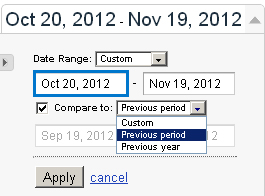Everyone wants to be number one. No matter what it is that you do, you're taught your entire life that being number one is the most important thing in the world. In SEO, that's long been the prevailing need of customers, "Get me ranked number one!" Well, I'm here to tell you that it's really not that important.
Did you just hear the needle scrape across the record? Well, if you did sit back and relax. Everything's going to be okay. More and more research shows that there is a tremendous amount of variance in Google's rankings. Depening on what keywords you're looking at, your position may change daily, hourly or even faster than that. SEOmoz's recent post tracks the variance of three keywords over the course of a week and showed that 80.2% of search results change each day. WOW.
So regardless of exactly what you're doing, your rankings are going to be bouncing around. Rather than stressing out over a couple of keywords and thinking the sky is falling when a couple of your keywords drop from 2nd to 5th for a couple of days, what should you be paying attention to?
Better Metrics
Non-branded organic traffic— this is a personal favorite. Keep an eye on this number to see where you're going in search. To track this, go to traffic sources>sources>search>organic in Google Analytics and then run an advanced filter (click the blue advanced button above your keyword data as you see below) and choose to exclude your brand keyword. Quick tip: use a partial version of your keyword to eliminate multiple variations. For example, we get a lot of searches for a lot of variations of Nicholas Creative— so if we exclude "Nich" it usually gets rid of the most of them. You can add multiple exclusions if you have more than one brand term.

So why is this metric the one you want to track? For me, it's the simplest way to tell if your SEO efforts are continuing to drive more traffic. A lot of extraneous items (TV ads, PR, word of mouth, etc.) can get people searching for you and your brands by name. But if people are looking for your product category, products or services in a non-branded fashion and finding you, that's what you really want. If this number continues to trend upward, things are going the right way.
Another note here is that you may want to filter for the term "not provided" as well. For users logged into Google services, their organic search data doesn't show. This started last fall and it skews the data a bit, but it's hard to say which way it will skew moving forward. So it's a judgment call on this one. Just know that your data won't be perfect either way.
As a final note, be sure to check for seasonality. To do this, you'll want to use the date selector in Google and take a look at not only the previous month, but the previous year. Often I hear clients panicking about a monthly drop in traffic, but in reality it happens every year.

Making a quick check of the comparisons in monthly traffic and yearly traffic can help make sure you're still going in the right direction. You may be down 10% month to month, but if you're up 50% compared to the same date range last year, that perspective can calm either yourself or those you report to.